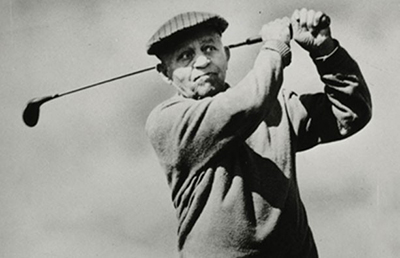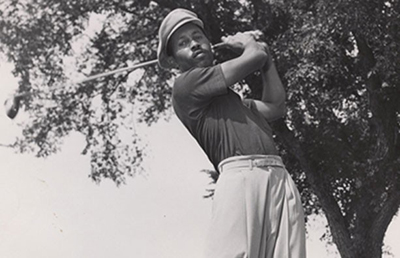
John Shippen played golf in an era before the PGA restricted blacks from the sport. He played in the U.S. Open six times, twice finishing in fifth place, in 1896 and 1902.

Teddy Rhodes sued his way into the U.S. Open in 1948, and he was the first black golfer to play in the tournament since John Shippen, 35 years earlier. Rhodes fought his way into numerous tournaments over his playing career, and he later coached Althea Gibson and Lee Elder.
By Jason Lewis
Sentinel Sports Editor
[email protected]
Jackie Robinson broke the color barrier in baseball in 1947. Kenny Washington and Woody Strode (teammates of Robinson while playing football at UCLA) did the same in football in 1946. But before them, there were black players in their respective sports.
There were black baseball players in Major League Baseball in the late 1800s, and there were black football players in the NFL up until 1933. But both sports discontinued integrated leagues, and were white only leagues for several years.
Golf was no different, as Teddy Rhodes broke the color barrier in 1948 when he played in the U.S. Open. He is regarded as the first black professional golf player, but he was certainly not the first black golfer, as the sport was integrated at one point before blacks were banned from competing professionally.
Years before Rhodes, John Shippen Jr. had to pass as a Native American in order to compete. He was born in 1879 in Long Island, New York. His father was a Presbyterian minister, and he held a degree in theology from Howard University.
Shippen’s father was assigned to a church on the Shinnecock Indian reservation in Southampton, New York. The second U.S Open was played at Shinnecock Hills golf course, and Shippen, along with a full-blooded Native American named Oscar Bunn, entered the tournament.
Just before the tournament began a number of white players protested and threatened not to show up if Shippen and Bunn were allowed to play. But United States Golf Association (USGA) President Theodore Havemeyer took a stand, saying that the tournament would go on as scheduled, even if Shippen and Dunn were the only two golfers playing.
The tournament went on, with white golfers playing along side Shippen and Dunn.
The white players may have had a reason for not wanting Shippen in the tournament, because after the first round he was in a tie for first place. He went on to play well in the tournament, finishing in fifth place, which earned him $10.
Shippen would play in the U.S. Open five more times, again finishing in fifth place in 1902. His last appearance was in 1913. After that point it would be 35 years before another black man would play in the tournament.
In 1948 Rhodes made the cut at the Los Angeles Open to continue on to the Richmond (California) Open. When he showed up, along with fellow black golfers Bill Spiller and Madison Gunter, they were denied access because they were black.
The three golfers sued the PGA for $315,000, saying that their livelihood was being deprived by the PGA based on race. The PGA promised to invite black players to their top tournaments, so the lawsuit was dropped.
Rhodes broke the color barrier by being the first black golfer to play at the U.S. Open since Shippen. It did not take long for Rhodes to be the talk of the tournament, not only because of his race, but because he “scared the hell out of some Southerners…” by opening the first round with a 1-under-par 70. That left him only three strokes behind Ben Hogan.
Rhodes, who was from Nashville, Tennessee, fought his way into 69 PGA events, finishing in the top 20 nine times. His fight continued because the PGA went against the agreement that they reached with Rhodes, Spiller, and Gunter, by circumventing the agreement by changing its tournaments to invitationals, in which they only invited white players.
Rhodes played in mostly United Golf Association sanctioned tournaments, winning about 150 times. Unfortunately for him, when all of the color barriers had been lifted by 1961 he was forced to retire because of an ailing kidney.
After Rhodes’ playing career was finished he coached many black golfers, including Althea Gibson and Lee Elder.
In 2009 the PGA of America granted posthumous membership to Shippen, Rhodes, and Spiller.
Check out the Sentinel Sports Section on Facebook and Twitter.
Sentinel Sports Section Facebook page:
http://www.facebook.com/?ref=logo#!/pages/Los-Angeles-Sentinel-Sports-Section/137328139648009
Sentinel Sports Twitter page:






